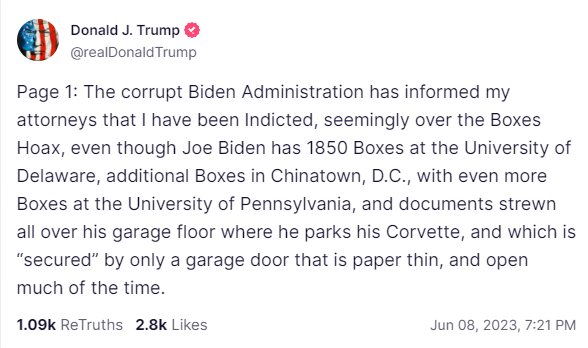Trump to be indicted - again.
-
@Jolly said in Trump to be indicted - again.:
I know you're disappointed, but I don't think he does guys ...
I suspect he would if I wore a mask

-
@George-K said in Trump to be indicted - again.:
@LuFins-Dad said in Trump to be indicted - again.:
Mayor Maternity Leave
Felonia Milhous von Pantsuit?
That’s bench, not rocking chairs…
@LuFins-Dad said in Trump to be indicted - again.:
@George-K said in Trump to be indicted - again.:
@LuFins-Dad said in Trump to be indicted - again.:
Mayor Maternity Leave
Felonia Milhous von Pantsuit?
That’s bench, not rocking chairs…
Nah. She’s the White Walker.

-
It could also be that they both committed crimes and their respective prosecutors are ambitious and very much want the feather in their cap.
@Jon said in Trump to be indicted - again.:
It could also be that they both committed crimes and their respective prosecutors are ambitious and very much want the feather in their cap.
And one indictment took 6 months from the discovery of the alleged crime to happen.
The other alleged crime(s) were discovered more than 3 years ago - and still no indictment. That doesn't sound particularly ambitious to me.
-
You know, there's no constitutional prohibition of a felon being elected president.
He could serve from a prison cell, and then, on day 1 pardon himself.
C'mon it's only a little more ridiculous than holding an impeachment trial of someone who isn't even president.
-
[Trump’s view] hasn’t held up well. (https://www.tiktok.com/t/ZT81hdwCp/)
-
The indictment (PDF):
https://d3i6fh83elv35t.cloudfront.net/static/2023/06/trump-indictment.pdf
Washington Post's breakdown of the 37 charges, including range of penalties: https://www.washingtonpost.com/dc-md-va/2023/06/09/trump-charges-classified-documents/
-
Republicans Should Reject the Comey Precedent
As Andrew McCarthy observed, the parallels (to Clinton - GK)are hard to avoid. Trump allegedly violated record-keeping requirements in statute and potentially exposed sensitive information to unauthorized eyes. So, too, did Clinton. Trump is said by prosecutors to have obstructed investigators’ work. More than 30,000 emails in Clinton’s possession were destroyed despite the congressional subpoena targeting them. The distinction between the two is in how the DOJ — specifically, the FBI under Director James Comey — handled the case against Clinton.
In what has become an infamous statement to the press, on July 5, 2016, Comey concluded that “no reasonable prosecutor” would find grounds for an indictment against Clinton in relation to her decision to house classified materials on an unsecured “home brew” server and transmit those materials via private email servers and electronic devices. While the bureau found “evidence of potential violations of the statutes regarding the handling of classified information,” Comey determined that those violations could not be successfully prosecuted.
But as Republicans said to all who were willing to listen, the standard Comey set for prosecuting Clinton went well beyond the existing statute and had not been applied before. Indeed, this standard has not been applied since. Comey set a terrible precedent that does not deserve to be observed as one. At least, that is the conclusion we might draw from the statements Republicans made at the time.
In a grilling before the GOP-led House Oversight and Government Reform Committee on July 7, 2016, Comey confirmed that Clinton’s public comments regarding the server and her conduct were false or misleading. He defended himself by indicating that he could not “establish that [Clinton] acted with the necessary criminal intent.” After all, “the secretary may not have been as sophisticated as people assume,” Comey said, ostensibly, in Clinton’s defense. How one could be “extremely careless” and “negligent” while also being too dense to understand the gravity of their misconduct is a mystery that remains unsolved.
The FBI director himself confessed that he was “setting” a “precedent,” and Republicans agreed. Though Comey defended it as one designed to “treat everybody fairly,” GOP lawmakers called it a “dangerous precedent.” Representative Paul Ryan said it appeared like “preferential treatment for Clinton.” Senator Rand Paul asserted that the “rule of law has been shattered.” The FBI director “has rewritten a clearly worded federal criminal statute,” Senator Ted Cruz agreed. “It seems that there are two standards,” said former representative Jason Chaffetz. “The fact pattern presented by Director Comey makes clear Secretary Clinton violated the law. Individuals who intentionally skirt the law must be held accountable.”
...
If Trump is found to have violated the law — not just the mishandling of classified materials, which seems only ever to be a prosecutable offense if the alleged offender is not a household name, but the allegedly deliberate misleading of investigators and obstructive conduct — he should face the consequences he himself has said should befall anyone who violates the statutes that apply to the handling of confidential materials.The equal but opposite uneven application of justice is no remedy for the uneven application of justice. The fact that the Comey precedent, applied to Trump’s case, might exculpate him of misconduct despite the publicly available evidence suggestive of his guilt demonstrates that the FBI director abdicated his duties in 2016. Republicans were right to reject the Comey standard then. They should continue to reject it today.
-
The indictment (PDF):
https://d3i6fh83elv35t.cloudfront.net/static/2023/06/trump-indictment.pdf
Washington Post's breakdown of the 37 charges, including range of penalties: https://www.washingtonpost.com/dc-md-va/2023/06/09/trump-charges-classified-documents/
-
-
That’s a lot of sleight of hand on McCarthys part. Note he used the passive voice in Hillary’s case “documents were destroyed”.
@Jon said in Trump to be indicted - again.:
That’s a lot of sleight of hand on McCarthys part.
Please elaborate.
It's not McCarthy's column - it's Noah Rothman (my bad - I should have been clear). He's referencing a McCarthy column.
Note he used the passive voice in Hillary’s case “documents were destroyed”.
That's like saying "
BidenTrump didn't carry the boxes to thegaragebathroom."Phones were destroyed, and tens of thousands of emails about recipes (as though Clinton even knew where the kitchen is) and wedding plans were deleted.
McCarthy's column says:
Trump’s best selective-prosecution argument involves Hillary Clinton. The former secretary of state set up an unauthorized, laughably insecure home-brew server system, which she used for years to conduct State Department business. This was a willful act: Clinton sought to defeat government record-keeping and record-disclosure requirements, including the mandate that officials conduct government business via government facilities — a mandate Clinton enforced on her subordinates as a cabinet secretary.
Because Clinton’s position was steeped in sensitive foreign-relations and national-security matters, by setting up an insecure email system, she was guaranteeing that national-defense information would be transmitted through it. Indeed, she used the system to communicate with President Obama, including from what the FBI gingerly referred to as “the territory of . . . an adversary” (which was probably Russia). The FBI found that classified information was stored in Clinton’s system, some of it designated at the highest level of sensitivity — the “Top Secret/Special Access Program” level. The bureau further acknowledged it was highly likely that Clinton’s system had been penetrated by hostile actors, including foreign intelligence operatives. When Clinton’s system came to light, she caused over 30,000 emails to be deleted and destroyed, even though a congressional subpoena had been issued for them.
The Clinton precedent is a strong basis for Trump to argue that, in fairness, he should not be charged. Nevertheless, if he is charged, it will not be a legal defense at trial — although he will surely try to use it for jury-nullification purposes. At trial, the only issue for the jury will be whether Trump committed the offenses charged against him. It will be beside the point that someone else committed analogous crimes but was not charged.

